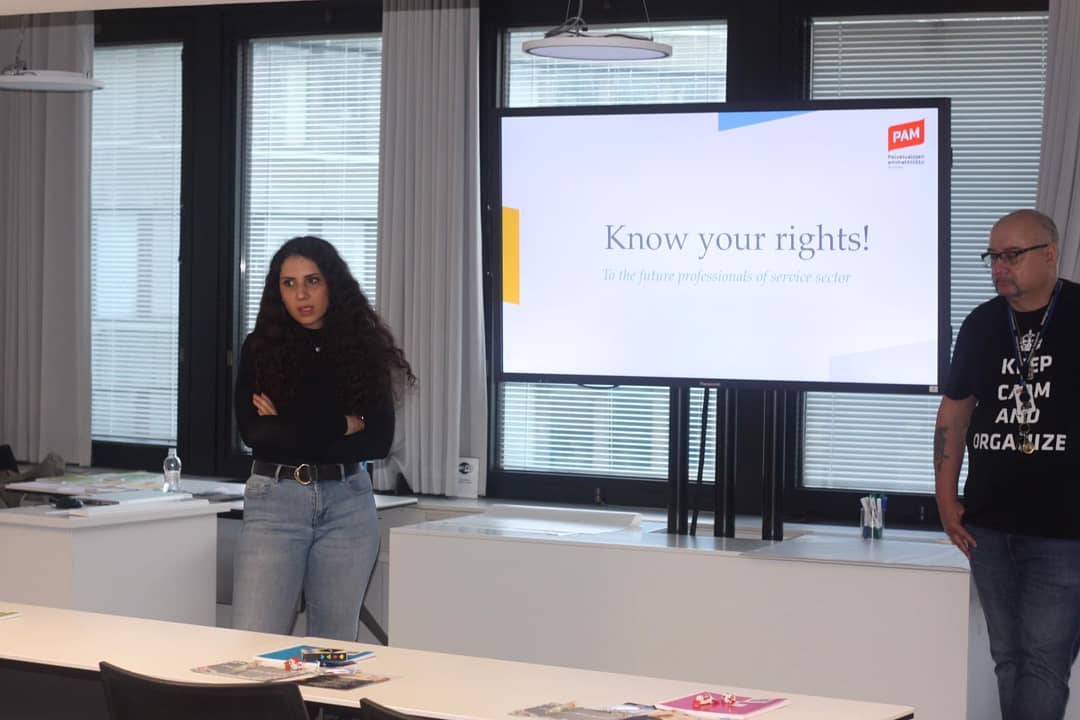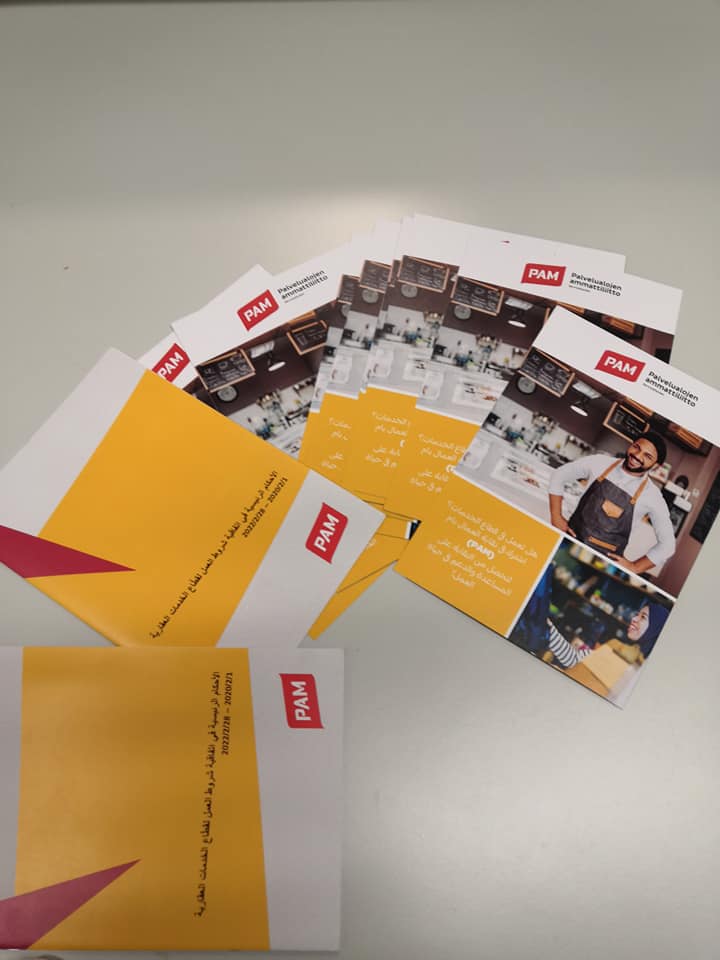Empowering Arabic speaking workers in Finland
Working conditions for Arabic speaking employees residing in Finland are frail. This fact was the steppingstone for a project that added awareness about worker’s rights and union activities within the community. It also connected workers with the Service Union United PAM on a whole new level.
“The initiative for the project came from the Arabic speaking community in Finland”, Sandra Imran tells.
Imran, who is the chairperson of Mirsal, an association for Arabic speaking immigrants in Finland, has witnessed an increase in exploitation of foreign workers due to their vulnerable position on the labour market.
This was the steppingstone for the project “Arabic workers in Finland” launched in spring of 2020 supported by Moniheli ry.
“Many of us has experienced work related problems. There are also workers who do not have sufficient language skills and who have been prone to exploitation as they depend solely on their employer for the work permit”, she explains.
Based on a Facebook survey Mirsal did in the Arabic speaking community, the majority of the respondents in the survey revealed that they had at least one time been treated wrongly or exploited in their workplace.
“We discovered that many of the workers did not know the first thing about trade unions, nor who to turn to if they have questions or real problems at work”.
Mirsal sought out the Service Union United PAM as one project partner.
“PAM is the biggest Finnish trade union, and many work in the private service sector, so we knew a cooperation like this would be very important”, Imran says.

The aim of the project was not only to raise awareness about trade unions and their roles, but also to help members to turn into active members of the trade union.
“Those who already have joined a union do not necessarily realize what a membership has to offer”, Imran adds and mentions free courses, events and legal aid.
This coincides with some of the results in PAM’s own survey. Very few of union members with a foreign background are engaging in union activities or running for work place elections.
Culture differences a factor to consider
According to Sandra Imran, trade unions are not very common in Arabic countries, and you would have to be more or less an activist to belong to a trade union. It is also part of the culture to be respectful and not to question superiors.
“Arabic workers rely much on the word of the employer. And if the employer happen to be from the same country, workers seldom double check the information they are given out of courtesy”.
She continues:
“Besides, many employers with such a cultural background have a strong opinion about unions and if an employee belongs to the union, it is similar to breaking the duty of loyality towards the employer”, she adds.
This is the reason why Mirsal organized workshops for employers.
“We felt there is the need for employers to know how to treat their employees according to the law and to give basic business knowledge for this country”, she mentions.
Several partners were included in the project. Imran lists the Employee Rights Advisory Service by SAK, RIKU and other organizations such as Amal, Finland-Marocco society, Radio Espoo International and Moniheli. Another main partner in the project was The Finnish Construction Trade Union (Rakennusliitto).
Through the network, Mirsal was able to reach out to an even larger Arabic speaking community within the project. The Service Union United PAM also played a key role. The cooperation with the union Imran describes as positive and flexible.
“We organized a visit to PAM, where our community members met with PAM experts. Topics like the trade unions role to non-Finnish members, shop stewards, disputes and membership benefits were discussed and documented by video for online publication. In addition, we received materials in Arabic language, which we shared on our webpage and in our Facebook page Mirsal ry“, she elaborates.
The closed Facebook group Friends of Mirsal مرسال has become a popular information channel and melting pot for Arabic speaking people in Finland and it has around 1 500 followers today. In the group, you can find information on work opportunities, services and current corona info in Arabic.
When Imran sums up the project, she is content that the report carried out at the end of the project showed improvements.
“We saw a change for the better in our members’ awareness about union activities, where to turn for help and a change in the employers’ preconceptions towards unions. We have also received requests on how to join a union, as everything is done online, as well as possibilities to join as students while studying”, she concludes.

She acknowledges that many of the above things are baby steps, and there is still a big number of immigrants that not been reached. However, the association is planning to go on with work life workshops and assisting workers in Arabic.
Sandra Imran is confident that providing materials and information in the worker’s own mother tongue has made a difference for the positive outcome of the project.
“The main problem is that many workers lack language skills such as basic Finnish or English. This is something that not only the Arabic speaking community, but other communities as well, are facing here in Finland”, she says.
And if she was able to change anything in the Finnish legislation, what would it be?
“Asylum seekers should have the right to financial aid if they have been members of an Unemployment Fund*. This became an issue when the corona pandemic came on last spring and many without a residence permit were left without financial support during lay-offs”, she points out.
She also has a message to Finnish workplaces.
“I wish Finnish workplaces would be more flexible and open minded to new workers with a foreign background. Many of them don’t have enough understanding of the Finnish culture, so give them the chance, be patient and make sure that they understand the information given”, she concludes.
* Asylum seekers are not covered by Finnish housing-based social security until they receive a residence permit. Consequently, they are not entitled to housing-based social security, including unemployment benefits. Unemployment funds operate in accordance with this principle when granting earnings related daily allowances as well.
Mirsal has recently received funds from the Ministry of Employment and the Economy of Finland for a follow-up project. The association has also applied to STEA – Funding Centre for Social Welfare and Health Organisations, for an extension of the project to include other languages such as Russian, Estonian, Kurdish, Somali and Chinese.
Text:: Marie Sandberg-Chibani



